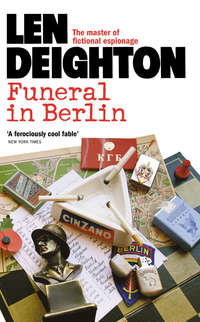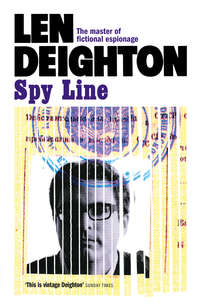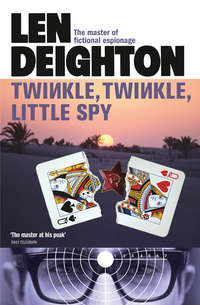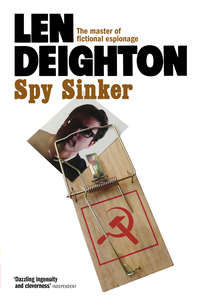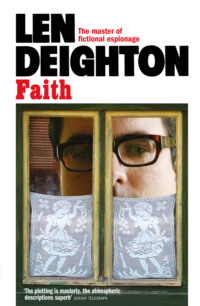
Полная версия
Mexico Set
‘I suppose his wife likes it there,’ I said.
‘What’s that got to do with it?’ said Dicky. ‘Would I take an intelligence job in Canada because my wife liked ice hockey?’
‘No, Dicky, you wouldn’t.’
‘And this fellow Stinnes will see what’s good for him. Frank Harrington thought the chances were good.’
‘You talked about all this with Frank?’
‘Sure. Frank has to be in on it because Stinnes is based in Big B. Stinnes is very much in his territory, Bernard.’ A nervous movement of fingers through curly hair. ‘The worst difficulty is that the Data Centre showed that Stinnes has an eighteen-year-old son. That might prove sticky.’
‘Christ, Dicky,’ I said, as I came to terms with this bombshell. ‘Did you know all this when we left London?’
‘Enrolling Stinnes, you mean?’
‘Yes, enrolling Stinnes I mean.’
‘It looked as if it might go that way.’ That was Dicky on the defensive. He’d known all along, that was obvious. I wondered what else he knew that he was not going to tell me about until it happened. ‘London Central put out a departmental alert for him, didn’t they?’ We had reached the carnitas stand by now. He selected a chair that didn’t wobble and sat down. ‘I’ll have mine wrapped in a tortilla; pork skin is very fattening.’
‘London Central puts out departmental alerts for clerks who make off with the petty cash.’
‘But they don’t send senior staff, like us, to identify them when they are spotted,’ said Dicky.
‘Enrolled,’ I said, considering all the implications. ‘A hotshot like Stinnes. You and me? It’s madness.’
‘Only if you start thinking it’s madness,’ said Dicky. ‘My own opinion …’ Pause. ‘For what’s it’s worth …’ A modest smile. ‘… is that we stand an excellent chance.’
‘And when did you last enrol a KGB major?’
Dicky bit his lip. We both knew the answer to that one. Dicky was a pen-pusher. Stinnes was the first KGB officer Dicky had ever come this close to, and he hadn’t seen Stinnes yet.
‘Isn’t London proposing to send someone over here to help? This is a complicated job, Dicky. We need someone who has experience.’
‘Nonsense. We can do it. I don’t want Bret Rensselaer breathing down my neck. If we can pull this one off, it will be a real coup.’ He smiled. ‘I didn’t expect you to start asking London for help, Bernard. I thought you were the one who always liked to do everything on his own.’
‘I’m not on my own,’ I said. ‘I’m with you.’ The stallholder was stirring his cauldron of pork and arranging suitable pieces on a large metal platter.
‘And you’d prefer to work with your friend Werner, eh?’
I could hear danger signals. ‘We were at school together,’ I said. ‘I’ve known him a long time.’
‘Werner Volkmann isn’t even employed by the department. He hasn’t been employed by us for years.’
‘Officially that’s right,’ I said. ‘But he’s worked for us from time to time.’
‘Because you give him jobs to do,’ said Dicky. ‘Don’t try to make it sound as if the department employs him.’
‘Werner knows Berlin,’ I said.
‘You know Berlin. Frank Harrington knows Berlin. Our friend Stinnes knows Berlin. There is no great shortage of people who know Berlin. That’s no reason for employing Werner.’
‘Werner is a Jew. He was born in Berlin when the Nazis were running things. Werner instinctively sees things in people that you and I have to learn about. You can’t compare his knowledge of Berlin and Berliners with anything I know.’
‘Calm down. Everyone knows Werner is your alter ego, and so mustn’t be criticized.’
‘What do you want? You can have “lean meat”, “pure meat”, “meat without fat” or “a bit of everything”.’
‘What’s the difference between …’
‘Don’t let’s get into semantics,’ I said. ‘Try surtido, that’s a bit of everything.’ Dicky nodded his agreement.
Dicky, who always showed a remarkable aptitude for feeding himself, now discovered that a carnitas stand is always conveniently close to those that sell the necessary accompaniments. He provided us with salsas and marinated cactus, and was now discovering that tortillas are sold by the kilo. ‘A kilo,’ he said as the tortilla lady disappeared with the payment and left him with a huge pile of them. ‘Do you think they’ll keep if I take them back for Daphne?’ He wrapped some of the pork into the top tortilla. ‘Delicious,’ he said as he ate the first one and took a second tortilla to begin making another. ‘What are all those pieces?’
‘That’s ear, and those pieces are intestine,’ I said.
‘You just wait until Daphne hears what I’ve been eating; she’ll throw up. Our neighbours came out to Mexico last year and stayed in the Sheraton. They wouldn’t even clean their teeth unless they had bottled water. I wish I had my camera so you could photograph me eating here in the market. Now what is it again – carnitas? I want to get it exactly right when I tell them.’
‘Carnitas,’ I said. ‘Surtido.’
Dicky wiped his mouth on his handkerchief and stood up and looked round the market square. Just from where we were sitting I could see people selling plastic toys, antique tables and gilt mirrors, cheap shirts, brass bedsteads, dog-eared American film magazines and a selection of cut-glass stoppers that always survive long after the decanters. ‘Yes,’ said Dicky. ‘It’s really quite a place, isn’t it? Fifteen million people perched at seven thousand feet altitude with high mountain tops all round them and thick smog permanently overhead. Where else could you find a capital city with no river, no coastline and such lousy roads? And yet this is one of the oldest cities the world has ever known. If that doesn’t prove that the human race is stone-raving mad, nothing will.’
‘I hope you don’t think I’m going to walk right up to Stinnes and offer him a chance to defect,’ I said.
‘I’ve been thinking about that,’ said Dicky. ‘The Volkmanns already know him. Shall we let them make the first overtures?’
‘Werner doesn’t work for the department. You just told me that.’
‘Correction,’ said Dicky. ‘I said that Werner’s knowledge of Berlin is not sufficient reason for using him in Berlin. Let’s remember that Werner has had a “non-critical employment only” tag on his file.’
‘You can be a spiteful bastard, Dicky,’ I said. ‘You’re talking about that signals leak in 1978. You know very well that Werner was completely cleared of suspicion.’
‘It was your wife who did it,’ said Dicky. Suddenly he was angry. He was angry because he’d never suspected Fiona of leaking secrets, and now I realized that Dicky saw me as someone who had helped to deceive him rather than as Fiona’s principal victim.
The sky was darkening with clouds now and there was the movement of air that precedes a storm. I never got used to the speedy effects of the heat and humidity. The sweet smell of fresh fruits and vegetables had filled the air when we first arrived at the market. Now it was already giving way to the smells of putrefaction as the spoiled, squashed and broken produce went bad.
‘Yes, it was my wife who did it. Werner was innocent.’
‘And if you’d listened you’d have heard me say that Werner has had a “non-crit” tag on his file. I didn’t say it was still there.’
‘And now you’re going to ask Werner to enrol Stinnes for you?’
‘I think you’d better put it to him, Bernard.’
‘He’s on holiday,’ I said. ‘It’s a sort of second honeymoon.’
‘So you told me,’ said Dicky. ‘But my guess is that they are both getting a bit bored with each other. If you were on your honeymoon – first, second or third – you wouldn’t want to spend the evenings in some broken-down German club in a seedy part of town, would you?’
‘We haven’t seen the club yet,’ I reminded him. ‘Perhaps it’s tremendous.’
‘I love the way you said that, Bernard. I wish I could have recorded the way you said “tremendous”. Yes, it might be Mexico’s answer to Caesar’s Palace in Vegas, or the Paris Lido, but don’t bank on it. You see, if it was me on a second honeymoon with that delectable little Zena, I’d be in Acapulco, or maybe finding some sandy little beach where we could be undisturbed. I wouldn’t be taking her along to the Kronprinz club to see who’s winning the bridge tournament.’
‘The way it’s turned out,’ I said, ‘you’re not taking the delectable little Zena anywhere. I thought I heard you saying you didn’t like her. I remember you saying that one honeymoon with Zena would be enough for you.’ From the sulphurous yellow sky there came a steady drum-roll of thunder, an overture for a big storm.
Dicky laughed. ‘I admit I was a little hasty,’ he said. ‘I hadn’t been away from home for very long when I said that. The way I feel now, Zena is looking sexier and sexier every day.’
‘And you think talking to Stinnes about Western democracy and the free world will give the Volkmanns a new interest in life,’ I said.
‘Even allowing for your sarcasm, yes. Why don’t you put it to them and see what they say?’
‘Why don’t you put it to them and see what they say?’
‘Look at those children and the donkey and the old man with the sombrero. That would make the sort of photo that wins prizes at the Photo Club. I was so stupid not to bring a camera. But have you seen the sort of price you have to pay for a camera in this country? The Americans are really putting the squeeze on the peso. No, I think you should put it to them, Bernard. You get hold of Werner and talk with him, and then he could go along to the Kronprinz Club tonight and see if Stinnes is there.’ He stopped at a stall to watch a man making chiles rellenos, putting meat fillings into large peppers. Each one got a big spoonful of chopped chillies before being deep-fried and put in a garlicky tomato sauce. Just looking at it made me feel queasy.
‘Werner will have to know what London is prepared to offer Stinnes. I assume there will eventually be a big first payment, a salary and contractual provisions about the size of the house they’ll get and what sort of car and so on.’
‘Is that the way it’s done?’ said Dicky. ‘It sounds like a marriage contract.’
‘They like it defined that way because you can’t buy houses in East Europe and they don’t know the prices of cars and so on. They usually want to have a clear idea of what they are getting.’
‘London will pay,’ said Dicky. ‘They want Stinnes; they really want him. That’s just between us, of course; that’s not for Werner Volkmann to know.’ He touched the side of his nose in a conspiratorial gesture. ‘No reasonable demand will be refused.’
‘So what does Werner say to Stinnes?’ On the cobbled ground there were shiny black spots appearing one after the other in the grey dust. The rain had come.
‘Let’s keep it all very soft-sell, shall we?’ said Dicky. His wife Daphne worked in a small advertising agency. Dicky told me that it had very aggressive methods with really up-to-date selling techniques. Sometimes I got the feeling that Dicky would like to see the department being run on the same lines. Preferably by him.
‘You mean we don’t brief Werner?’
‘Let’s see how the cookie crumbles,’ said Dicky. It was an old advertising expression that meant put your head in the sand, your arse in the air and wait for the explosion.
My prediction that the rain came only in the afternoons was only just right. It was a few minutes after one o’clock when the rain started. Dicky took me in the car as far as the university, where he was to see one of his Oxford friends, and there – on the open plaza – let me out into steady rain. I cursed him, but there was no hostility in Dicky’s self-interest; he would have done the same thing to almost anyone.
It was not easy to get a cab but eventually an old white VW beetle stopped for me. The car’s interior was battered and dirty, but the driver’s position was equipped like the flight deck of a Boeing jet. The dashboard was veneered in walnut and there was an array of small spanners and screwdrivers and a pen-shaped flashlight as well as a large coloured medallion of the shrine of the Virgin of Guadalupe. In contrast to the derelict bodywork of the little car, the young driver was dressed in a freshly starched white shirt with a dark-grey tie and looked more like a stockbroker than a cab driver. But Mexico is like that.
The traffic moved slowly through the heavy rain but it didn’t make less noise. There were two-stroke motorcycles and cars with broken mufflers and giant trucks – some so carefully painted up that every bolt-head, rivet and wheel-nut was picked out in different colours. Here on the city’s outskirts, the wide boulevard was lined with a chaos of broken walls, goats grazing on waste ground, adobe huts, rubbish tips, crudely painted shop-fronts in primary colours and corrugated-iron fences defaced with political slogans and ribaldry. Despite the rain, drunks sprawled full-length on the pavement and the barbecue fires hissed and flared at the taco counters.
By the time we got near to Werner Volkmann’s apartment, the rainstorm was flooding the gutters and making great lakes through which the traffic splashed, and in which it sometimes stalled. There was a constant racket of car horns and engines being over-revved by nervous drivers. The cab moved slowly, and I watched drenched and dirty kids offering dry, clean lottery tickets that were protected inside clear plastic bags. And plenty of well-dressed shoppers had chauffeurs who could hold an umbrella in one hand and open the door of a limousine with the other. I couldn’t imagine Zena Volkmann anywhere but here in the Zona Rosa. Within the area contained by the Insurgentes, Sevilla and Chapultepec there are the big international hotels, smart restaurants, the shops with branches in Paris and New York. And in the crowded cafés that spill out on to the pavement are to be heard every new rumour, joke and scandal that this outrageous town provides in abundance.
Zena Volkmann could live anywhere, of course. But she preferred to live in comfort. She’d learned to respect wealth, and the wealthy, in a way that only a poverty-stricken childhood teaches. She was a survivor who’d climbed up the ladder without benefit of any education beyond reading and writing and painting her face, plus a natural ability to count. Perhaps I did her an injustice but sometimes I had the feeling that she would do anything if the price was high enough, for she still had that fundamental insecurity that one bout of poverty can inflict for a lifetime, and no amount of money remedy.
She made no secret of her feelings. Even amid the contrasts of Mexico she showed no great interest in the plight of the hungry. And like so many poor people she had only contempt for socialism in any of its various forms, for it is only the rich and guilty who can afford the subtle delights of egalitarian philosophies.
Zena Volkmann was only twenty-two years old but she’d lived with her grandparents for much of her childhood. From them she’d inherited a nostalgia for a Germany of long ago. It was a Protestant Germany of aristocrats and Handküsse, silvery Zeppelins and student duels. It was a kultiviertes Germany of music, industry, science and literature; an imperial Germany ruled from the great cosmopolitan city of Berlin by efficient, incorruptible Prussians. It was a Germany she’d never seen; a Germany that had never existed.
The elaborate afternoon Kaffee-Trinken that she’d prepared was a manifestation of her nostalgia. The delicate chinaware into which she poured the coffee, and the solid-silver forks with which we ate the fruit tart, and the tiny damask napkins with which we dabbed our lips were all parts of a ceremony that was typically German. It was a scene to be found in the prosperous suburbs of any one of a hundred West German towns.
Zena’s brown silk afternoon dress, with embroidered collar and hem below the knee, made her look like a dedicated hausfrau. Her long dark hair was in two plaits and rolled to make the old-fashioned ‘earphone’ hairstyle virtually unknown outside Germany. And Werner, sitting there like an amiable gorilla, had gone to the extent of putting on his tan-coloured tropical suit and a striped tie. I was only too aware that my old rain-wet open-necked shirt was not exactly de rigueur, as I balanced the coffee-cup on the knee of my mud-splashed nylon pants.
While Zena had been in the kitchen I’d told Werner about my trip to Biedermann’s house, about the Russians I’d seen there and Biedermann’s confession to me. Werner took his time to answer. He turned to look out of the window. On a side-table the broken fragments of a cup and saucer had been arranged in a large ashtray. Werner moved the ashtray to the trolley that held the TV. From this sixth-floor apartment there was a view across the city. The sky was low and dark now, and the rain was beating down in great shimmering sheets, the way it does only in such tropical storms. He still hadn’t answered by the time Zena returned from the kitchen.
‘Biedermann always was a loner,’ said Werner. ‘He has two brothers, but Paul makes all the business decisions. Did you know that?’
It was small talk, but now Zena was with us and I was undecided about how much to say in front of her. ‘Are both his brothers in the business?’
Werner said, ‘Old Biedermann gave equal shares to all five of them – two girls and three boys. But the others leave all the decisions to Paul.’
‘And why not?’ said Zena, cutting a slice of fruit tart for me. ‘He knows how to make money. The other four have nothing to do but spend it.’
‘You never liked him, did you, Bernie?’ said Werner. ‘You never liked Paul.’
‘I hardly knew him,’ I said. ‘He went off to some fancy school. I remember his father. His father used to let me steer the trucks round their yard while he operated the accelerator and brakes. I was only a tiny child. I really liked the old man.’
‘It was a filthy old yard,’ said Werner. He was telling Zena rather than me. Or perhaps he was retelling it to himself. ‘Full of junk and rubbish. What a wonderland it was for us children who played there. We had such fun.’ He took a piece of tart from Zena. His slice was small; she was trying to slim him down. ‘Paul was a scholar. The old man was proud of him but they didn’t have much in common when Paul came back with all those college degrees and qualifications. Old Mr Biedermann had had no proper education. He left school when he was fourteen.’
‘He was a real Berliner,’ I said. ‘He ran the transport business like a despot. He knew the names of all his workers. He swore at them when he was angry and got drunk with them when there was something to celebrate. They invited him to their marriages and their christenings and he never missed a funeral. When the union organized a weekend outing each year they always invited him along. No one would have wanted to go without the old man.’
‘You’re talking about the road transport business,’ said Werner. ‘But that was only a tiny part of their set-up.’
‘It was the business the old man started, and the only part of the Biedermann empire he ever really liked.’ A timer began to ping somewhere in the kitchen but Zena didn’t move. Eventually it stopped. I guessed the Indian woman was there but banished to the back room.
‘It was losing money,’ said Werner.
‘So, when Paul Biedermann came back from his American business management course, the first thing he did was to sell the transport company and pension his father off.’
‘You sound very bitter, Bernie. That couldn’t be why you hate Paul so much, could it?’
I drank some more coffee. I began to have the feeling that Zena didn’t intend to leave us alone to talk about the things we had to talk about. I kept the small talk going. ‘It killed old Biedermann,’ I said. ‘He had nothing to live for after the yard closed and the company was being run from New York. Do you remember how he used to sit in Leuschner’s café all day, talking about old times to anyone who would listen, even to us kids?’
‘It’s the way things are now,’ said Werner. ‘Companies are run by computers. Profit margins are sliced thin. And no manager dare raise his eyes from his accounts long enough to learn the names of his staff. It’s the price we pay for progress.’
Zena picked up the ashtray containing the broken cup and saucer. I could tell that Werner had broken it by the way she averted her eyes from him. She took the coffee-pot too and went to the kitchen. I said, ‘Dicky saw Frank Harrington in LA. Apparently London have decided to try enrolling Erich Stinnes.’ I had tried to make it unhurried but it came out in a rush.
‘Enrolling him?’ I was interested to see that Werner was as dismayed and surprised as I had been. ‘Is there any background?’
‘You mean, have there been discussions with Stinnes before. I was wondering the same thing myself but from what I got out of Dicky I think the idea is to go in cold.’
Werner leaned his considerable weight back in the armchair and blew through his pursed lips. ‘Who’s going to try that?’
‘Dicky wants you to try,’ I said. I drank some of my strong coffee and tried to sound very casual. I could see that Werner was torn between indignation and delight. Werner desperately wanted to become a regular departmental employee again. But he knew that being chosen for this job was no tribute to his skills; he was simply the man closest to Stinnes. ‘It’s a great opportunity,’ said Werner resentfully, ‘a great opportunity for failure. So Frank Harrington, and all those people who’ve been slandering me all these years, can have a new excuse and start slandering me all over again.’
‘They must know the chances are slim,’ I said. ‘But if Stinnes went for it, you’d be the talk of the town, Werner.’
Werner gave me a wry smile. ‘You mean both East and West sides of it?’
‘What are you talking about?’ said Zena, returning with the coffee. ‘Is this something to do with Erich Stinnes?’
Werner glanced at me. He knew I didn’t want to discuss it in front of Zena. ‘If I’m going to try, Zena will have to know, Bernie,’ he said apologetically. I nodded. The reality was that Werner told her everything I told him, so she might as well hear it from me.
Zena poured more coffee and offered us a selection of Spritzgebäck, little German biscuits that Werner liked. ‘It is about Stinnes, isn’t it?’ she said as she picked up her own coffee – she drank it strong and black – and sat down. Even in this severe dress she looked very beautiful; her big eyes, very white teeth and the high cheekbones in that lightly tanned face made her look like the work of some Aztec goldsmith.
‘London want to enrol him,’ said Werner.
‘Recruit him to work for London, do you mean?’ said Zena.
‘You recruit ordinary people to become spies,’ Werner explained patiently. ‘But an enemy security officer, especially one who might help you break his own networks, is “enrolled”.’
‘It’s the same sort of thing,’ said Zena brightly.
‘It’s very different,’ said Werner. ‘When you recruit someone, and start them spying, you paint romantic pictures for them. You show them the glamour and make them feel courageous and important. But the agent you enrol knows all the answers already. Enrolment is tricky. You are telling lies to highly skilled liars. They’re cynical and demanding. It’s easy to start it off but it usually goes sour some way along the line and everyone ends up mad at everyone else.’
‘You make it sound like getting a divorce,’ said Zena.
‘It’s a bit like that,’ I said. ‘But it can get more violent.’
‘More violent than a divorce?’ Zena fluttered her eyelashes. ‘You’re only going to offer Erich Stinnes a chance to defect to the West. Can’t he do that any time he wants? He’s in Mexico. Why go back to Russia if he doesn’t want to?’ There was something deliciously feminine about Zena and her view of the world.
‘It’s not as easy as that,’ said Werner. ‘Not many countries will allow East European nationals to defect. Seamen who jump ship, passengers or Aeroflot crew who leave their planes at refuelling stops, or Soviet delegates who walk into foreign police stations and ask for asylum find it’s not so easy. Even right-wing governments send them right back to Russia to face the music.’ He bit into a biscuit. ‘Good Spritzgebäck, darling,’ he said.


